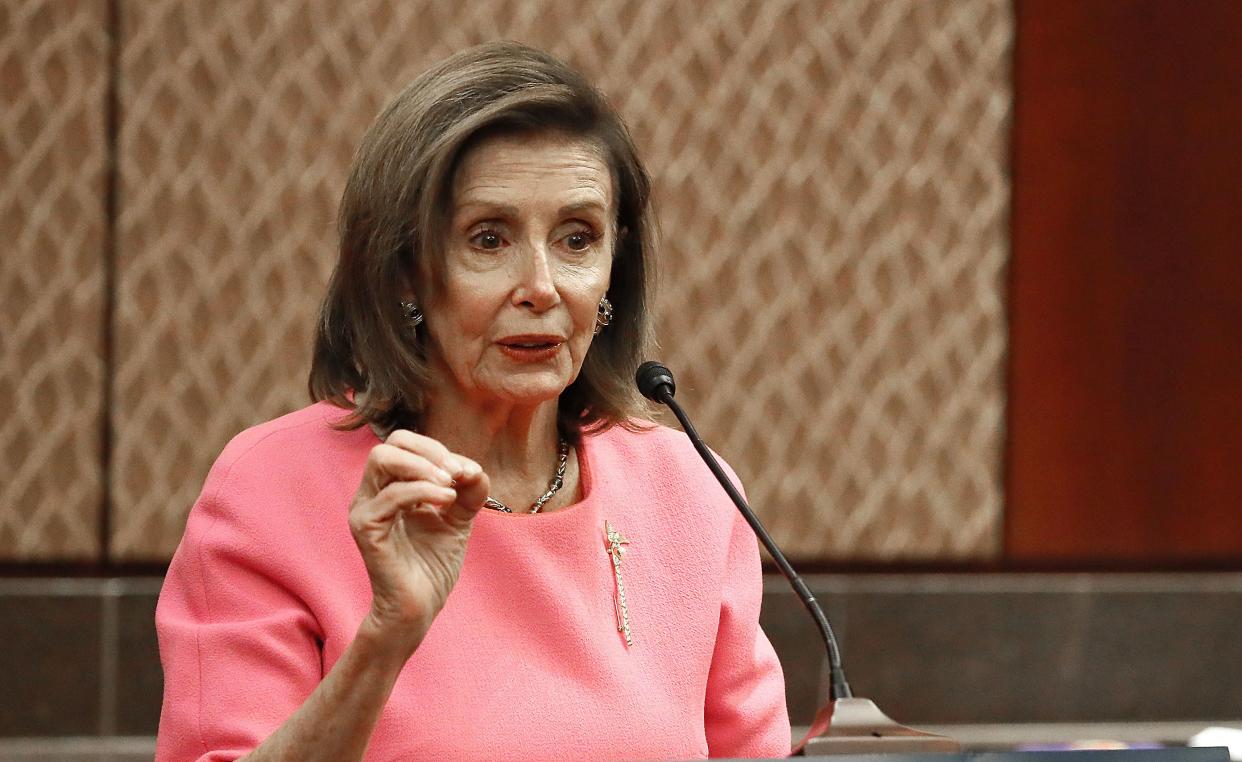Bipartisan infrastructure bill set to miss Monday vote deadline, Pelosi says
The final steps to passing President Biden’s sweeping economic agenda are going to be messy, House Speaker Nancy Pelosi (D-Calif.) indicated Sunday.
Two pieces of legislation are on the table: a roughly $1 trillion bipartisan infrastructure package that includes funding for road and bridge improvements, projects to protect the country from global warming, expansion of broadband internet and more.
The other is a $3.5 trillion package containing steps to improve education, child support, health care and generally expand the social safety net.
The challenge for Pelosi: Progressive House Democrats have vowed to withhold their support of the bipartisan bill unless the $3.5 trillion package — which lacks any Republican support — gets a vote at the same time. They believe delaying the infrastructure bill, a top priority of moderate Dems, would create pressure to back the bigger package.
The timing seems unlikely to work out for meeting Pelosi’s deadline.
“I’m never bringing a bill to the floor that doesn’t have the votes,” she said. “You cannot choose the date. You have to go when you have the votes in a reasonable time. And we will.”
Rep. Pramila Jayapal, a Washington state Democrat who heads the House Progressive Caucus, agrees “the votes aren’t there” to pass the $1 trillion bill on Monday.
“I don’t believe there will be a vote,” Jayapal said on CNN’s “State of the Union.” “The Speaker is an incredibly good vote counter and she knows exactly where her caucus stands.”
The larger spending resolution made it out of the House Budget Committee on Saturday, paving the way for it to head to the floor for a full vote this week.
While voicing confidence the House will take up both packages this week, Pelosi said the larger one will likely get a price cut.
With moderate Democrats pushing for less ambitious spending, a reduction to the final cost “seems self-evident,” she said.
Assuming unanimous Republican opposition, Democrats can lose no more than three votes to pass their priorities in the House, The New York Times reported.

“We’re at a stalemate at the moment, and we’re going to have to get these two pieces of legislation passed,” Biden said on Friday at the White House. “Both need to be passed.”
Biden, who is promoting the bills as part of his “Build Back Better” agenda to boost jobs and keep the U.S. globally competitive, also said last week that talks on the legislation could stretch to the end of the year.
“What the president has put forth will create many, many more good-paying jobs, especially in terms of addressing the climate crisis, which has not been fully addressed in the infrastructure bill,” Pelosi said.
The $3.5 trillion package would establish universal pre-K for 3- and 4-year-olds, lower the eligibility age for Medicare, add dental, hearing and vision benefits to Medicare and build on the infrastructure investments in the $1 trillion bill.
Lacking Republican support, Democrats plan to pass the larger package through a process known as budget reconciliation.
Sen. Joe Manchin, a moderate Democrat from West Virginia who has emerged as a key vote, said there was no rush to pass the larger package and reiterated his concern that it might cause inflation.
“What’s the need? There is no timeline. I want to understand it,” Manchin told Politico in an interview published on Saturday.
Meanwhile, government funding is set to expire on Oct. 1. A stop-gap spending proposal by Democrats includes provisions to raise the government debt ceiling, a move that Senate Minority Leader Mitch McConnell (R-Ky.) said Republicans will oppose.
With News Wire Services
